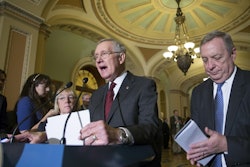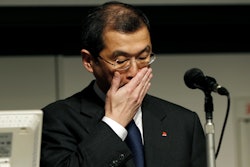FUTURE-01
the Eve of Iowa; Investigation into "Top Secret" Emails; Interview with
Congressman Darrell Issa; Interview with Senator Rand Paul of Kentucky - Part 2>
Department; Government; Justice; Rand Paul; Policies>
BARTIROMO: So, what is the strategy to get those young people out and voting for you?
PAUL: Well, you know, our goal is 10,000 college students. We've worked very hard on the college campuses. We have Rand Paul chapters at all 20 college campuses here. We have about 100 students in the headquarters for the last several weeks making phone calls. We've made over 1 million phone calls.
So, we think we're going to surprise a lot of people. The polls really don't have very many young people in them because they're all on cell phones. We also think we're doing very well with independents.
And we think after the last debate, see all these polls are before the last debate. We think we did well to point out differences and really hopefully to stoke our numbers.
BARTIROMO: And do you think that your message of small government, libertarian, is resonating with this group? Because I know, Senator, as you know, the criticism about the small government and most GOP voters agree they want small government, not when it comes to the military. Not at this moment in time when we've got terrorists wanting to kill America.
PAUL: Well, I think the real question is do we think regime change in the Middle East has made us safer or made us less safe. I would argue that toppling Gadhafi in Libya, which was supported by Rubio and Hillary Clinton didn't make us safer. That it led to chaos. It led to the rise of radical Islam.
And this is still a big debate now in Syria. You've got the neo- conservatives that want to bomb both sides. They want bomb ISIS and they want to bomb Assad. My fear is that if you topple Assad, ISIS will become stronger.
So, I think there really is a great debate going on in our party on what is the best strategy for moving forward.
BARTIROMO: And what does that translate when it comes to money spent on defense? Pentagon, $600 billion budget. What should it be?
PAUL: You know, if you look at balancing the budget, we borrow $1 million a minute. Really part of the problem is the right does want more military spending and the left wants more domestic spending. They get together and they raise both, but the taxpayer gets stuck with the bill.
And so, really, if you are fiscally conservative, and I think I'm the only one, you do have to look at military spending. We spend $600 billion. That's equal to Russia, plus China, plus eight more countries.
Marco Rubio wants -- and Cruz frankly want $1 trillion more in military spending. That won't make us stronger. I think we can spend what we have and what we're spending currently and just spend it more wisely.
BARTIROMO: Let me switch gears and I ask you a little more about economics here. Last week, we got more dreadful news. Durable goods orders for one indicating businesses are not investing in their plants and equipment and business. Durable goods down 5.1 percent. GDP anemic, up 0.7 percent. What's the motion towards lever you could pull as President Paul in terms of getting growth moving in this country?
PAUL: I think the biggest thing that's impeding growth is the Federal Reserve keeping interest rates below the market, so you get boom and then bust. We have the real estate boom caused by the Federal Reserve. Now, we have a stock market boom that I think we're on the edge of it collapsing or changing dramatically.
If you want to have a strong country, you have to have strong currency. But you have to get rid of price controls. Price controls don't work for bread. They don't work for food. They don't work for cars or oil.
But price controls on the money don't work as well. They lead to misallocation of resources and ultimately to recession and a bust in the economic cycle.
BARTIROMO: So, do away with the Federal Reserve?
PAUL: Well, what I would do is I would audit the Fed to begin with. And then I would try to free up interest rates where they're not so directed and not so much under the thumb of the Federal Reserve. Then we can see what happens over time.
But I think the Federal Reserve has too much power and a lot of their power has led to income inequality in our country and has led to the boom and bust cycle.
BARTIROMO: Senator, real quick, we're going to talk with the panel in a moment about Bernie Sanders and Hillary Clinton. What's your take on this latest e-mail news that 22 e-mail exchanges are deemed top secret, so much so that the public will not actually see that -- those e-mails along with the other e-mails that have been released.
PAUL: I don't know how Hillary Clinton escapes indictment. I mean, if you treat her with the same sort of exactitude that they had for General Petraeus, I don't see how she's not indicted and how she doesn't end up with a conviction.
I think this is worry some for Democrats in particular because if Hillary Clinton is indicted and becomes a criminal and ineligible for office, they're stuck with a socialist who I think whose ideas are actually indictable because socialism is such a failed economic system, I don't know how you're going to run in America, a country that's been made great by capitalism and say, oh, we want to become Cuba, or we want to become Russia. I just don't know how that message is going to resonate in our country.
BARTIROMO: Senator, we'll be watching you trying to convince the younger voters of that very point, who many of whom believe Bernie Sanders is their guy.
Good to see you, sir. We'll be watching all the activity tomorrow.
PAUL: Thank you.
BARTIROMO: Senator Rand Paul joining us.
Let's get a look at what's coming up top of the hour, "MEDIA BUZZ". Here's Howie Kurtz in Iowa.
Good morning, Howie.
HOWARD KURTZ, "MEDIA BUZZ" HOST: Good morning from Des Moines, Maria.
Well, we're going to look at the extraordinary amount of coverage over the war of words between Donald Trump and FOX News over him skipping the debate here the other night. We'll talk to Bret Baier and Chris Wallace for get behind-the-scenes look at the surreal situation without knowing until the final minutes whether the frontrunner was going to show up.
Also, Ed Henry stops by to talk about this tight Hillary Clinton/Bernie Sanders race, the impact of the e-mail revelations that you just mentioned. And as well as the press finally starting to scrutinize Senator Sanders who before didn't really think the guy was going to win, and wasn't getting as much media scrutiny -- all coming up here in Iowa.
BARTIROMO: We're going to talk about that as well. See you in 20 minutes, Howie. Thanks so much.
Remember when Hillary Clinton seemed like the inevitable Democratic nominee? Well, now, it is crutch time in Des Moines. She's in a virtual dead heat with Bernie Sanders. They both are scrambling to nail down voters before they turn out to caucus. The state of the race with one day to go with our panel, as we look ahead on SUNDAY MORNING FUTURES, next.
(COMMERCIAL BREAK)
BARTIROMO: Welcome back.
Hillary Clinton and Bernie Sanders barnstorming across the Hawkeye State, scrambling to pick up last-minute supporters and those crucial undecided voters. Check out this latest "Des Moines Register" poll. The two are virtually neck and neck, 45 percent of voters say Clinton is their pick for the Democratic presidential nomination, 42 percent say it's Sanders.
Back with our panel now, Ed Rollins, Mary Kissel, Hank Sheinkopf.
Mary, what do you think?
(CROSSTALK)
KISSEL: I think that Hillary's e-mail whoa woes are hurting her. I think Bernie Sanders comes off as an honest candidate. I think his attacks on her taking Wall Street money have hurt her. And frankly speaking, I think those on the left side of politics, they may be cynical, but they don't like to be lied to.
I think the more we learn about this e-mail scandal, the more mendacious Hillary is. And, frankly speaking, Bernie profits from it.
BARTIROMO: Hank, I did not realize she was paid $600,000 from Goldman Sachs for a speech. That was wow. Bernie Sanders got all the numbers and he's just campaigning with it.
SHEINKOPF: Well, it's smart. He is the Barack Obama candidate of this cycle. He is talking about transformation. She is much more static.
And the truth is, this is -- this whole political system is in such turmoil right now that Donald Trump is an insurgent on the right and Bernie Sanders looks fresh.
BARTIROMO: Yes.
SHEINKOPF: This is very -- something wrong here.
BARTIROMO: Do you think this latest e-mail dump is going to hurt Hillary Clinton? I mean, 22 e-mails are top secret, according to the FBI.
SHEINKOPF: Somebody started yesterday, there won't be an indictment. Listen, you don't have to Clarence Darrow to understand that Deutsche, and others, Petraeus and certainly significant government officials and people have been indicted under conditions like this that may not have been as bad. The question here is when, and when does the Justice Department move and under what conditions? Not, is it possible?
BARTIROMO: So you think it's when not if that gets indicted?
SHEINKOPF: If this continues, if there's more leakage of it -- more of these things leak out. They don't leak out by accident, OK? This kind of discussion is not by accident. If this continues, how does she not receive the same treatment as others received?
ROLLINS: There's 150 FBI agents investigating. And the head of the FBI is a very honorable man.
BARTIROMO: Jim Comey.
ROLLINS: And he was appointed to that because of his honesty.
SHEINKOPF: Absolutely.
ROLLINS: And he's going to get a recommendation I'm sure to indict her. I don't know whether the Justice Department will do it, and I certainly don't think the White House will do it.
So, you're going to have the FBI who investigated thoroughly. This has all been publicly disclose or somewhat public disclose. I think whether she gets indicted or not is going to be not as relevant as the fact that she's been very dishonest in the course of her 30-year career. This will just totally reinforce it and the stories will be out there by 150 sources with these guys investigating it.
BARTIROMO: Darrell Issa earlier on the show, Mary, said that the FBI wants to indict Hillary and Huma, her number two.
KISSEL: Well, again, there's been a series of lies here. The server was just for personal use. She was only carrying one device. There was no classified information on it.
We have four inspector generals reports coming out and saying, actually, no, that's not the case. Look, Jim Comey is an honorable guy. The integrity of the FBI is at stake. It's not a partisan institution.
But likewise, the integrity of the Justice Department is going to be at stake if Comey comes out with a very comprehensive report and a recommendation to indict.
ROLLINS: Just go back to the beginning. She couldn't find her Whitewater documents that had been subpoenaed. They were hidden in a closet in the White House and they find them three years later.
That was a total violation of law and nothing ever happened to her. She's done this her whole life. There's been a pattern. The more that gets pushed in the forefront, the more relevant --
SHEINKOPF: Whitewater is not going to be relevant. I don't agree with that. I do agree with Mary and that why --
ROLLINS: No, I'm talking about the integrity issue.
SHEINKOPF: This is not -- this is much more serious than anything that's come before it. This is about national security. And, by the way, people are going to pay attention to the words national security because we live in a period where people are feeling -- Americans are feeling obviously financially insecure and personally insecure. The terrorist threat is on that screen every day. That's why this has much more intensity.
BARTIROMO: Is the party making plan B's or are they all in on Bernie Sanders, if, in fact, we were to see in an indictment? Does Biden, you know --
SHEINKOPF: I don't think they know what to do any day. These parties -- let's remember they're really disorganized institutions much more so than in recent history besides.
KISSEL: And let's say she doesn't get indicted, they still have a problem because Hillary is trying to run for the third term of Obama. So, her pitch to voters is a tough pitch. Hey, I'm going to do everything the last guy did who gave you 2 percent growth and complete global disorder. There's nothing joyful by the way about Hillary's campaign. You know, they're sort of gutting it out like the Bataan death march.
BARTIROMO: You would think that's the same argument for Biden. I mean, I know Biden is well-liked on both sides, but is that another continuation of Obama's presidency.
ROLLINS: There's no youth in the Democratic Party. No one is going to baton ands move it forward. And I think the problem is both Clintons are very tired. She obviously is not moving anything forward other than this crisis that she's facing day in and day out. It's another terrible campaign and another terrible campaign will not be tolerated by a lot of Democrats who want to win again.
SHEINKOPF: They're running the '92 campaign. The hope is that, by the way, it won't be so bad, but if she comes in behind Bernie and then she does well in New Hampshire, they can say, look, I'm the comeback candidate.
BARTIROMO: Yes.
SHEINKOPF: This is a repetition.
BARTIROMO: Her answer in the NBC interview about the email scandal was just amazing. She said, "Oh, it's like Benghazi."
We'll take a short break.
The president will be welcoming a pair of top Republican leaders to the White House this week. What's on the agenda? We're looking ahead on SUNDAY MORNING FUTURES. Back with those important meetings the president will have with Paul Ryan and Mitch McConnell, next.
(COMMERCIAL BREAK)
BARTIROMO: Welcome back.
President Obama will be meeting with the top two Republican leaders of Congress this week. House Speaker Paul Ryan and Senate Majority Leader Mitch McConnell will be at the White House this Tuesday. The three set to hash out legislative priorities for the election year, the president hoping to build upon the bipartisan budget agreement reached last year.
Back with our panel.
Ed Rollins, what do you think about this meeting? Anything to come out of it?
ROLLINS: I don't think anything is going to come out. Ryan basically is a guy that has a plan. He wants to basically move us forward. McConnell has had a long history with the president, has been particular good. John Boehner thought the president was a liar and broken every deal they've ever dealt with.
So, Ryan is coming in with good faith. We'll see whether he can make -- make anything on his agenda. If he can't, then you're going to go back to chaos. I don't think much is going to happen other than a photo-op.
KISSEL: I don't think the president has done anything to build a relationship with either one of these gentlemen. Remember when he denounced Paul Ryan in public? He invited him to come in and talk about health care reform and then he publicly embarrassed him? Just as he embarrassed the Supreme Court justices, our conservative Supreme Court justices?
So, there's not a lot of trust here and it's not for lack of trying on the Republican side.
BARTIROMO: Hank, what do you think?
SHEINKOPF: I think Ryan and McConnell have something smart. If the Republicans want to hold on to the Senate, the best way to do that, one of the ways to show they're not combatively stupid. That they're smart.
Ryan gets the chance to show he's the youth, the face of the Republican Party, against all the old chaos going on in both party. And Obama gets to do what he really wants to do, which is play with the Republicans and hope that Hillary doesn't get here, but he has no interest of seeing Hillary Clinton being president.
BARTIROMO: Well, this is an important meeting, particularly after this budget agreement, right, at the end of last year. Because the fact is, Republicans got mad at Paul Ryan for giving in too much.
ROLLINS: They felt that it was Boehner's deal, they gave him a buy on it. Because it was not something he had negotiated himself. If he negotiates something like this in the foreseeable future, he'll play a very heavy price.
KISSEL: Well, look, you have to practice politics and the thing with the Ted Cruzes of the world, they don't want that, they just want to stand up and scream and yell and do nothing.
And so, you know, kudos to Paul Ryan, he did get some reform in that budget deal. It wasn't all a bad deal.
BARTIROMO: Yes.
KISSEL: I think the sad thing about this president is that he came in with a lot of political capital. There were a lot of bipartisan reforms he could have done. Take corporate taxes, both sides of politics agree, it's very destructive that we have the highest corporate tax rate in the world. Criminal justice reform, free trade, the Tran Pacific Partnership -- there's a lot on the table they could agree on. You just need the president to come to the table and deal.
BARTIROMO: We just heard last week another company is moving to Ireland. Right? Merging Johnson Controls and Tyco moving to Ireland because it's a better tax rate. So, you're right.
KISSEL: Yes, yes.
SHEINKOPF: That may all be true. But you know what politics and getting re-electing governs all. This is about what it looks, not what it may produce.
ROLLINS: I don't think that's going to be much produced. I think tax reform is critical, AS I said in the show before. If Ryan had stayed as chairman, I think we would have it.
SHEINKOPF: It's true.
ROLLINS: I think today, it's going to be very, very difficult to get in this political year.
BARTIROMO: But they all have plans for it. They're all talking about doing tax reform beginning in 2017. So --
ROLLINS: We need it now.
KISSEL: It's legacy making time for the president. What is his legacy? Doing deals with Iran, Russia in Syria, Cuba and the Castros. So, he's probably looking at his last year in office and saying, well, how am I going to be remembered? It's a good question.
ROLLINS: He wants to travel the world and be the Mandela, be more of an international --
BARTIROMO: Or he wants Hillary to name him to the Supreme Court.
SHEINKOPF: Or control the Democratic Party the way the Clintons have done for the last 30 years.
ROLLINS: He'll never control the Democratic --
SHEINKOPF: I'm just telling you, maybe in his mind.
(CROSSTALK)
KISSEL: I don't think he'll ever go away. I think we're going to have President Obama pontificating about American politics for many, many decades to come.
ROLLINS: In a very negative way.
(CROSSTALK)
KISSEL: In a negative way.
BARTIROMO: Quick break. One thing to watch next. Stay with us on SUNDAY MORNING FUTURES.
(COMMERCIAL BREAK)
BARTIROMO: Back with our panel with what's important next week.
Ed, what do you think?
ROLLINS: I think the market reaction to the bad quarter. I think that's going to be the important story than the Iowa elections.
BARTIROMO: Iowa elections and, of course, we have earnings as well next week, Mary.
KISSEL: Yes, that's right, Iowa as well. Not number one or number two but who's coming in number third, who's gaining momentum. And more importantly, who's dropping out of the race and who those votes are going to?
BARTIROMO: Hank, real quick?
SHEINKOPF: I'm looking at Mike Bloomberg, you know why? Because he may be the answer to independents and others alienated by both parties.
BARTIROMO: Wow. Good to see you all. Thanks so much.
We'll see you tomorrow on Fox Business.
(Copy: Content and Programming Copyright 2016 Fox News Network, LLC. ALL RIGHTS RESERVED. Copyright 2016 Roll Call, Inc. All materials herein are protected by United States copyright law and may not be reproduced, distributed, transmitted, displayed, published or broadcast without the prior written permission of Roll Call. You may not alter or remove any trademark, copyright or other notice from copies of the content.)






















